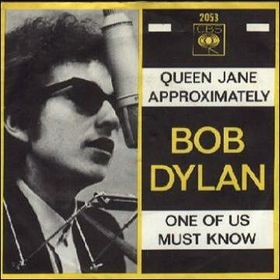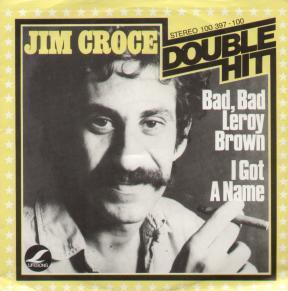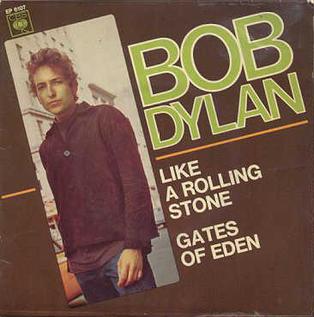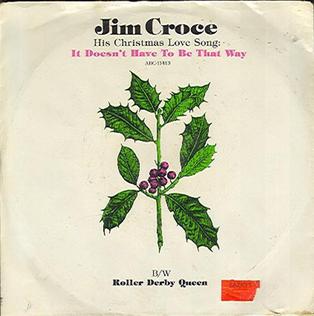
"The Night the Lights Went Out in Georgia" is a Southern Gothic murder ballad, written in 1972 by songwriter Bobby Russell and first recorded by his then wife, singer, comedian, and actress Vicki Lawrence. Lawrence's version, from her 1973 album of the same name, went to number one on the US Billboard Hot 100 chart after its release. Of several cover versions, the one recorded by Reba McEntire for her 1991 album For My Broken Heart peaked at number 12 on the Hot Country Songs chart.

"Queen Jane Approximately" is a song from Bob Dylan's 1965 album Highway 61 Revisited. It was released as a single as the B-side to "One of Us Must Know " in January 1966. It has also been covered by several artists, including the Grateful Dead and The Four Seasons.

"She Knows Me Too Well" is a song written by Brian Wilson and Mike Love for the American rock band The Beach Boys, about a man who is engrossed and obsessed in his own jealousy and insecurity. It was released on the 1965 album The Beach Boys Today!, initially serving as the B-side of their "When I Grow Up " single in 1964. It was one of the first songs that Brian wrote while under the influence of marijuana.

"Saturday Night's Alright for Fighting" (sometimes written "Saturday Night's Alright (For Fighting)") is a song originally recorded by English musician Elton John. John composed it with his long-time songwriting partner Bernie Taupin. It was released on John's best-selling album Goodbye Yellow Brick Road (1973) and as the first single. It has been covered by many artists and featured on motion picture, video game, and television soundtracks.

"Bad, Bad Leroy Brown" is an uptempo, strophic story song written by American folk rock singer Jim Croce. Released as part of his 1973 album Life and Times, the song was a No. 1 hit for him, spending two weeks at the top of the Billboard Hot 100 in July 1973. Billboard ranked it as the No. 2 song for 1973.

Madrugada is a 1974 album released by Melanie featuring the singles "Lover's Cross" and "Love to Lose Again". In November 1973, "Will You Love Me Tomorrow" became a Top 40 hit in the United Kingdom and was subsequently added to the British release of the album.

"Gates of Eden" is a song by Bob Dylan that appears on his fifth studio album Bringing It All Back Home, released on March 22, 1965 by Columbia Records. It was also released as a single as the B-side of "Like a Rolling Stone". Dylan plays the song solo, accompanying himself on acoustic guitar and harmonica. It is considered one of Dylan's most surreal songs. In a 2005 Mojo magazine poll of its writers and various well-known musicians, "Gates of Eden" was ranked 76th among Dylan's 100 greatest songs.

"I'll Have to Say I Love You in a Song" is the title of a posthumously released single by the American singer-songwriter Jim Croce. The song was written by Croce and was originally released on his album I Got a Name.

"Feel That Fire" is a song co-written and recorded by American country music artist Dierks Bentley. It was released in September 2008 as the first single and title track from his 2009 album of the same name. The song became Bentley's sixth Number One on the U.S. Billboard Hot Country Songs chart for the week of February 21, 2009.

"Down the Road" is a song written and recorded by American country music artist Mac McAnally. McAnally has charted with the song on two separate occasions. The first of these two versions was released as the second single from his 1990 album Simple Life, and was a minor chart single for him that year. Eighteen years later, McAnally re-recorded the song as a duet with Kenny Chesney on Chesney's 2008 album Lucky Old Sun. This rendition is also McAnally's highest charting country hit, having reached Number One in February 2009.
"Danny's Song" is a song written by American singer-songwriter Kenny Loggins, as a gift for his brother Danny for the birth of his son, Colin. It first appeared on an album by Gator Creek and a year later on the album Sittin' In, the debut album by Loggins and Messina. The song is well remembered for both the Loggins and Messina original, as well as for Anne Murray's 1972 top-ten-charting cover.

"You Don't Mess Around with Jim" is a 1972 strophic story song by Jim Croce from his album of the same name. It was Croce's debut single, released on ABC Records as ABC-11328. ABC Records promotion man Marty Kupps took it to KHJ 930 AM in Los Angeles, CA where it first aired. It made the KHJ "30" chart that week of June 6, 1972. After spending 11 weeks on the Billboard Hot 100 chart, the song peaked at No. 8 the week ending September 9. Croce performed the song on American Bandstand on August 12, 1972. Billboard ranked it as the No. 68 song for 1972.

"For Emily, Whenever I May Find Her" is a song written by Paul Simon and recorded by American music duo Simon & Garfunkel on their third studio album, Parsley, Sage, Rosemary and Thyme (1966). It is sung solely by Art Garfunkel, and consists mainly of his vocals with heavy reverb and a 12-string acoustic guitar. The lyrics concern finding a lover, although Simon once characterized the subject matter as being about a "belief," rather than about a specific individual.

"Yester Love" was a 1968 song by Motown Records R&B group The Miracles on its Tamla subsidiary label. It was recorded on December 18, 1967, and was included on the group's album, Special Occasion.

"I'm Not the One" is a song by the American rock band the Cars, from their fourth album, Shake It Up. It features Ric Ocasek on lead vocals, Benjamin Orr singing the 'you know why' phrase, and the whole group repeating "going round and round" as backing vocals throughout the song.

"I Got a Name" is a 1973 single recorded by Jim Croce with lyrics by Norman Gimbel and music by Charles Fox. It was the first single from his album of the same title and also Croce's first posthumous single, released the day after his death in a plane crash on September 20, 1973. The song reached a peak of #10 on the Billboard Hot 100, spending 17 weeks on the chart. It also hit #3 on the Cash Box Top 100.

"It Doesn't Have to Be That Way" is a song written and recorded by Jim Croce for his 1973 album Life and Times. Originally released early that year as the B-side of the "One Less Set of Footsteps" single, it was reissued that December as the third and final single from the album as well as Croce's second posthumously-released single. It reached a peak of #64 on the Billboard Hot 100, spending five weeks on the chart.

"The Right Thing to Do" is a song written and performed by Carly Simon that first appeared on her 1972 album No Secrets. The song was recorded at Trident Studios in London's Soho. It was released as the second single to the album, following "You're So Vain" and reached No. 17 on the Billboard Hot 100 and No. 4 on Billboard's Adult Contemporary chart. It also reached No. 20 on the Canada Top Singles chart and No. 9 on the Canadian Adult Contemporary chart. It reached No. 17 in the UK.

"Wheel in the Sky" is a song by the American rock band Journey, recorded in 1977 and included on their fourth studio album, Infinity. It was written and composed by Robert Fleischman, Neal Schon, and Diane Valory.
"The Cheater" is a song written by John Krenski, and performed by Bob Kuban and the In-Men that was released in October 1965. The band's lead singer Walter Scott received billing on the recording, which was produced by Mel Friedman. It features on their 1966 album Look Out for the Cheater.

















